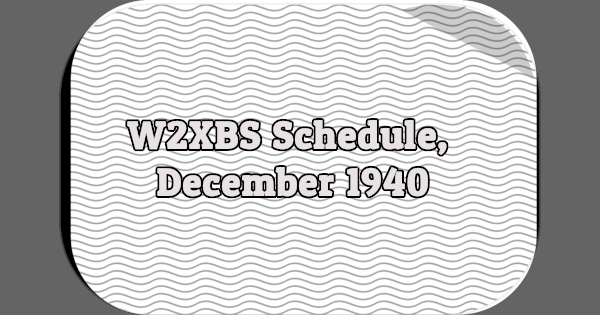Here’s the schedule for NBC’s experimental station W2XBS in New York City for the week starting Sunday, August 27th, 1939, straight from the weekly television listings printed in The New York Times. This is an important week for television history for two reasons. First, what was likely the very first movie trailer was broadcast on Friday, September 1st (I wrote about this back in May). More importantly, scenes from the Thursday, August 31st broadcast of the Dion Boucicault play “The Streets of New York” are the earliest known surviving footage from television in the United States. An excerpt is available for viewing online at the Paley Center for Media’s Website; read more about it here.
Tuesday, August 29th, 1939
12-1PM – Phillippe de Flores, Mexican singer; films; variety and news.
8:30-9:30PM – Play, “Dulcy,” by George S. Kaufman and Marc Connelly, with Helen Claire and Tom Powers.Wednesday, August 30th, 1939
12-1PM – Variety program; films; George Ross, Broadway columnist, and news.
8:30-9:30PM – Harvest Moon Ball, at Madison Square Garden.Thursday, August 31st, 1939 [1]
12-1PM – Fashion Show; Films; Mechanized Cavalry Parade on Fifth Avenue.
8:30-9:30PM – Play, “The Streets of New York,” by Dion Boucicault, with George Coulouris, Joyce Arling, Norman Lloyd.Friday, September 1st, 1939 [2]
12-1PM – Interview; Film; Variety Program; Leland Stowe, Correspondent.
3-4PM – Army Air Show, Mitchel Field.
8:30-9PM – “Vox Pop” Interviews
9-9:30PM – “Twinkletoes,” a New Wayburn program, and a film preview of “Golden Boy.”
Sources:
Works Cited:






September 1st, 1939 was also memorable for another reason: that was the day Germany invaded Poland, and the Second World War began in Europe as a result. The BBC’s “Home Service” television transmission abruptly signed off that day (right in the middle of a Mickey Mouse cartoon), and didn’t sign on again until exactly seven years later, in 1946 (using the same cartoon, almost at the point where they’d left off). You can be sure there were plenty of comments about the invasion on “VOX POP” [an early TV version of the popular radio show that featured comments from “average Americans” about certain topics and issues]. And that “Army Air Show” telecast that afternoon? A portent, perhaps, of things to come within three years…
The story I had heard was that BBC television got the word to go off the air during the “Mickey Mouse” cartoon, which was the last thing scheduled during their daytime transmission, but that by the time the transmitter at Alexandria Palace, London was about to be shut-off, the cartoon (and the daytime portion of the broadcast day) was already over. Supposedly, they ran a regular sign-off with nothing about “being off for the duration”….possibly because no one knew how long the TV broadcasting would be suspended for.
So the cartoon didn’t get cut off.
The concern was that a 45 megahertz signal (I believe that’s where BBC television transmitted) would make it easy for Nazi bombers to “hone in” on London.